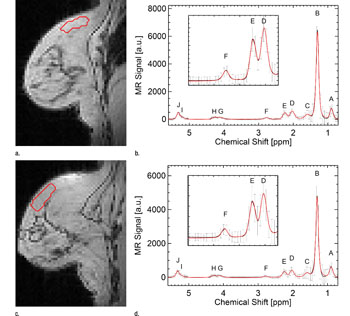Study Suggests Saturated Fatty Acid Levels Linked to Breast Cancer
By MedImaging International staff writers
Posted on 07 Jun 2016
The results of a new study, published in the June 7, 2016, online issue of the journal Radiology, may help researchers find underlying pathways of the development of breast cancer in some patients.Posted on 07 Jun 2016
Researchers have previously studied the role of fat in the development and growth of breast cancer extensively using measurements of Body Mass Index (BMI) and the intake of dietary fat. The researchers enrolled 89 patients for the final analysis of the study – 58 pre-menopausal women, and 31 post-menopausal women. The researchers evaluated the BMI of each patient and the status of their breast cancer.

Image: Analysis results of a post-menopausal woman with a benign lesion and a post-menopausal woman with invasive ductal carcinoma, using the new MRI technique (Photo courtesy of RSNA).
The researchers from the NYU Langone Medical Center (NY, NY, USA) performed the measurements using a new innovative Magnetic Resonance Imaging (MRI) technique called gradient-echo spectroscopic imaging that they developed. The novel technique enabled them to estimate fractions of different types of fat in breast adipose tissue during a clinical breast MRI exam.
The results showed that the breast tissue of post-menopausal women with invasive ductal carcinoma had a lower proportion of monounsaturated fatty acids and a greater proportion of saturated fatty acids than in post-menopausal women with benign breast tissue. Post-menopausal women with benign lesions had significantly higher levels of polyunsaturated fatty acids in their breast tissue, and lower levels of saturated fatty acids than pre-menopausal women. The researchers could not find a correlation between BMI and fatty acid fractions in breast tissue.
Sungheon G. Kim, PhD, NYU Langone Medical Center, said, “BMI is an important risk factor for breast cancer development. While increased BMI may provide a protective effect for premenopausal women, postmenopausal women have an increased risk of developing breast cancer with increasing BMI. Our research is ongoing. We need to investigate these higher levels of saturated fat and their direct correlation with tissue estrogen levels and cancer development. The results may point to a new risk factor for breast cancer.”
Related Links:
NYU Langone Medical Center














